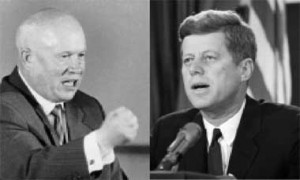
On its 50th anniversary, the Cuban Missile Crisis lives large in the American psyche as a time of pride. President Kennedy stared down the great Russian bear, who went quivering back into his cave. For 13 days the nation waited, poised on the brink of nuclear war, for Khrushchev to blink. It was an unmitigated vindication of military might and brinksmanship.
Or was it?
In light of recently unsealed records, historians now say the resolution of the standoff was really a triumph of backdoor diplomacy. The real story of what happened five decades ago was a bit more nuanced, and involved much less bravado and intimidation.
Attorney General Robert Kennedy met secretly with the Soviet ambassador Oct. 27 and conveyed an olive branch from his brother: Washington would publicly reject any invasion of Cuba, and Khrushchev would withdraw the missiles from the island. The real sweetener was that Kennedy would withdraw Jupiter nuclear missiles from U.S. installations in Turkey, near the Soviet border. It was a secret pledge known only to a handful of advisers.
The reality vs. the mythology is important in light of the political hay currently being made over Obama’s alleged “weakness” in the Middle East. The meme from the far-right says that attacks on our ambassador in Benghazi and Iran’s nuclear ambitions will only be curtailed by a Cuban Missile Crisis like standoff—that the U.S.A. needs to draw lines and dare our opponents to cross. Only then will America get the respect it deserves, and force our enemies to slink back to their caves.
The foreign policy being advocated from conservatives is similar to their approach to domestic policy. There will be no compromise as it shows weakness. There will be no apologies and no negotiations.
In 1962, Kennedy had the luxury of getting it both ways. He got to maintain the appearance of unyielding strength and intimidation at home, while granting concessions to the Soviets in an effort to avoid a devastating war nether side wanted. It’s not remotely clear Obama (or any modern President) could maintain that level of covert deal-making in the age of the Internet and 24-hour cable news. If a President tried and was discovered, he would be accused of conspiracy and cover-ups.
If the Cuban Missile Crisis happened today and played out exactly as it did 50 years ago, the President would be eviscerated by conservatives for negotiating with the enemy, compromising U.S. security in Europe, and positioning America as weak and unwilling to fight.
The right-wing pundits are correct that the Kennedy/Khrushchev showdown has lessons for modern foreign policy. But the lessons are in the reality of what occurred, not the mythology.
